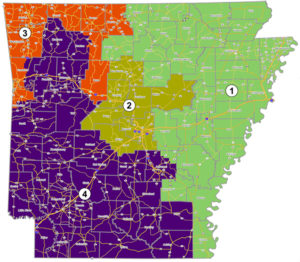
David Couch, the man who legalized medical marijuana in Arkansas, has another one up his sleeve.
The attorney who sponsored the Arkansas Medical Marijuana Amendment in 2016 is working with potential backers on an initiative that would let voters create a seven-member independent citizens commission to draw congressional and state legislative lines.
Couch said he polled the issue last summer and found statewide support in the 60s. Democrats overwhelmingly supported it, independents strongly did and even a majority of Republicans were in favor.
That last one may be the most significant because Republicans currently draw the lines. The state Legislature, which is almost three-fourths Republican, does so for Congress. State legislative lines are drawn by the governor, attorney general and secretary of state, collectively known as the Board of Apportionment. Lines are redrawn after each census, the next one occurring in 2020.
Legislative redistricting sounds boring, but it’s a hot topic
“Legislative redistricting” is probably not your number one issue, but it’s an important one. The Supreme Court is hearing cases from Texas, Maryland and Wisconsin this term regarding the practice of “gerrymandering.” Drawing the lines to benefit one political party is almost as old as the country itself, but in recent years, it’s become a data-driven science. With modern technology, the party in power can very effectively stuff the other party’s voters into a few districts while spreading out its own. Doing so helps it stays in power in later elections even if a majority of voters don’t support it. After the 2010 elections, Republicans took Democrats by surprise with how effectively they did this. You can bet Democrats will be ready after 2020 wherever they have power.
Arkansas’ lines aren’t too badly gerrymandered, in part because the Democrats who still controlled the Legislature after the 2010 elections weren’t able to get together and make it happen at the congressional level. Democrats tried to give their party a chance to win in southern and western Arkansas’ 4th District by stretching it all the way up to Fayetteville, where a lot of liberal voters live. Supporters couldn’t get the “Fayetteville finger” passed, and it wouldn’t have mattered. No redrawing of the lines would have overcome the state’s turn toward the Republicans during President Obama’s administration.
Two Republicans, two Democrats, three independents
Under Couch’s plan, two members of the commission would be Republicans and two would be Democrats. Those four would be selected by the majority and minority leaders in the Arkansas House and Senate. The other three would be independents selected by the four Republicans and Democrats on the commission. The state would fund it.
One of the notable aspects of the medical marijuana campaign was how low-key and understated it was. Couch said he would do the same with the independent commission.
“You take an issue that’s popular,” he said. “Then you just try not to mess it up. I think if you craft something that the people want and will vote for, then all you’ve got to do is say, ‘This is what it is, this is what it does, and go out and vote, please.’”
Has partners, needs funding
He says he working with good-government types with whom he’s previously worked regarding a 2012 ethics initiative. It didn’t make the ballot, but it was incorporated into an amendment that was referred to the voters by the Legislature and passed in 2014. He also helped craft a 2014 initiative approved by voters that raised the minimum wage.
He needs to raise $350,000 to $400,000 to gather signatures to put this one on the ballot. That’s a lot, but Couch said it’s easier to raise money from out-of-state donors in Arkansas than in other states. Because it’s a small state, you can get something passed relatively cheaply here and therefore demonstrate that it can work elsewhere. Arkansas is the only state in the neighborhood where medical marijuana is legal except for Louisiana, and it’s not legal to smoke it there. But now that Arkansas has passed it, Oklahomans will be voting on their own measure June 26.
David Couch has shown that a citizen doesn’t have to be an elected lawmaker to make laws. Will he succeed with this effort? Probably, if he can raise the money, collect the signatures, and keep it on the ballot after someone inevitably sues to keep it off.
And if he can’t make this one happen? He’s got about three others he’s working on.
By Steve Brawner
© 2018 by Steve Brawner Communications, Inc.
Is your organization looking for a speaker to talk about what’s happening in state or national politics? Steve Brawner is a syndicated columnist who appears in 10 newspapers and is a regular guest on AETN’s “Arkansas Week.” He’s cheap but not free.